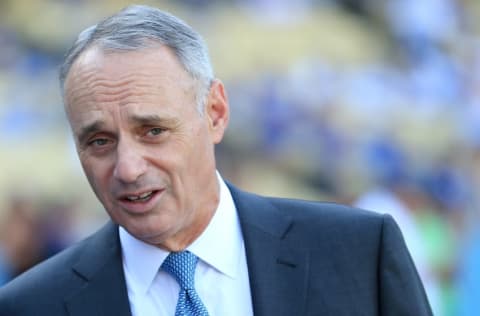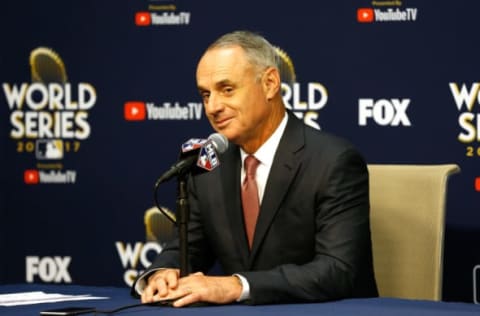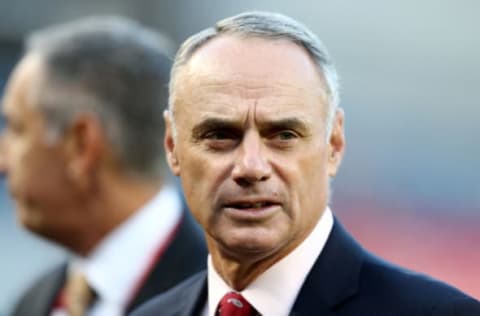Chicago Cubs: What the heck is MLB Commissioner Rob Manfred doing?


The Chicago Cubs and 29 other teams are focused on improving their clubs. Cue Rob Manfred to throw a hand grenade into the effort.
I have written several times about the perplexing actions during Rob Manfred’s reign as Baseball Commissioner. The first time was a year and a half ago and four other times since then. The issues are many and critical to the future of baseball, ranging from wrong ideas about addressing length of play, blackout restrictions, teams tanking, and a host of other matters large and small.
On top of all this, MLB is facing the most consequential Collective Bargaining Agreement (CBA) negotiations since the 1994-95 players’ strike and an investigation into a high tech sign-stealing scandal.
So as the Cubs engage in the hustle and bustle of GM meetings, Owners’ Meetings, contact tender deadlines, Winter meetings, trades, and looming free agent signings to offer up more of their nonsense, is it any surprise that once again Manfred and MLB are making terrible headlines?
Chicago Cubs: Is MLB out to kill baseball?
There is no other place where the idealism of baseball meets the future of MLB talent than in the minor leagues. From rural towns and cities to suburban ballparks, with names like the TV-made-famous Toledo Mud Hens, the Lansing Lugnuts, and the Amarillo Sod Poodles, these teams bring minor league baseball and all its wackiness to fans across the country.
Touchable, relatable, and still a bargain in most places, minor league baseball is a staple for fans who lack an MLB team or the income to afford to attend those games regularly,
And isn’t MLB trying to expand the reach of the game? While MLB teams are traveling to England, Mexico, and Japan, it’s trying to take the game away from fans here at home.
But the increasingly oligarchical Manfred has said off with your heads to 42 minor league teams. Manfred’s proposal was explained this way in the New York Post:
“1. Facilities are outdated in terms of capacity for expanded staff, workout equipment and even a space for players to eat. 2. Too many leagues are so widespread geographically that players suffer physically from long bus rides. 3. The affiliates feature too many players who face little to no chance of reaching the majors, and, 4. The players currently get paid too little, so if there are fewer players, then they can get paid more generously.”

Chicago Cubs: Manfred’s big lie
Oh, so this all about the players’ comfort and economic fortunes? Right, got it. Manfred is on the players’ side, and it’s those mean MiLB team owners fault. That would be nice, except that it is pure bunk. This move would eliminate one-quarter of the MiLB teams and require cutting the number of draft rounds roughly in half.
More from Cubbies Crib
- Cubs starting pitching has been thriving on the North Side
- Make no mistake: the Cubs are very much about power hitters
- Cubs are giving pitcher Javier Assad a deserved shot
- Cubs: It’s time to start thinking about potential September call-ups
- Cubs: P.J. Higgins deserves to be in the lineup on a daily basis
Anyone who thinks fewer minor league teams and players means more dough for those who are drafted isn’t paying attention. All it means is more profit for the MLB teams who would now have to support fewer teams and fewer players.
In addition, the notion that there are too many players who face little or no chance to make the majors, so it’s no loss to eliminate them is nonsense. Sure, players drafted in later rounds face steeper odds, and that’s what makes those successes even more special. Guys like:
Zach Davies (26th round)
Kevin Kiermaier (31st round)
Tyler Flowers (33rd round)
The 2016 infamous World Series Game Seven tying HR hitter Rajai Davis? (38th round)
Brad Peacock (41st round) who pitched in the 2017 World Series
Carl Edwards Jr. (48th round)
Under oligarch Manfred’s plan, these guys and hundreds of others never play professional ball.
What a loss.

Chicago Cubs: Manfred fires the opening salvo in CBA talks
Not content with declaring war on minor league baseball, Manfred declared war on another front. Negotiations over a new CBA with the MLBPA.
Tensions have been rising between MLB team owners and the MLBPA ever since the 2017-2021 CBA was inked. Under Bud Selig, who endured the 1994-95 strike, MLB played the role of broker, an entity that worked to de-escalate tensions and work compromises that kept the peace. Not so Manfred, who seems determined to force a confrontation.
The MLBPA and MLB agreed to start “preliminary talks” supposedly to ensure a smooth transition from the current CBA to the new one that would go into effect in 2022. It went badly right off the bat, pardon the pun.
According to NBCSports, Manfred characterized the early talks this way:
“The comments, the way the conversation actually went, as opposed to the way that it was spun: we invited the MLBPA to come forward with suggestions about midterm modifications that might address some of their concerns. In the meeting, Mr. Meyer suggested a series of changes that would turn the Basic Agreement back 50 years. I mean, essentially give back to the union everything we’ve achieved over the last few decades. I asked, in response to his suggestion, what was in that deal for the clubs? He said, ‘Labor peace.’ The way the conversation actually went is I said to him, ‘Labor peace is a mutual benefit. It’s not something that you trade economics against. It is a mutual benefit it keeps the players working and getting paid and it keeps our business forward.’ That’s how the conversation actually went.”
Now, this comment is just dumb on its face. First, fifty years ago, the reserve clause was still in effect, and baseball was still three years away from the Flood v. Kuhn case that ended up as the basis for nullifying the reserve clause.
Second, as I said, peace between the players’ union and owners was achieved through economics. As the pie got more abundant, so did everyone’s slices. MLB’s role was arbitrating the precision of the slices. However, since then, players’ salaries have been declining even as profits for owners and MLB have reached record highs through TV deals and wallet-busting ticket and concession prices that have fans deserting MLB ballparks like the plague hit.
Chicago Cubs: Ooops…maybe Manfred went too far
The reaction to Manfred’s comments was harsh and not just from the MLBPA. Fans across the country, perhaps realizing both the gravity of the situation and finally reaching the limit on how much they are willing to pay to see a game, hit back at hard.
So now this sop to the fans. Manfred announced at the Owners’ Meeting last week that MLB might be willing to rethink the blackout rules for cord-cutters as early as next spring.
The blackout has long been the bane of fans and more so now that increasing numbers of households have gone to streaming services rather than traditional cable or satellite systems like DISH or DirecTV.
Next. Chicago Cubs: Top three signs the team isn’t in decline. dark
But in my book, it’s too little too late. That should have been done a decade or more ago. Baseball fans have great tolerance for their sport and their favorite teams. They suffered through the1994-95 strike seasons, the PED scandal, tear downs and rebuilds, and now a high tech cheating scandal. But being ripped off while being told by the Commissioner that they’re not? That could be the ballgame.